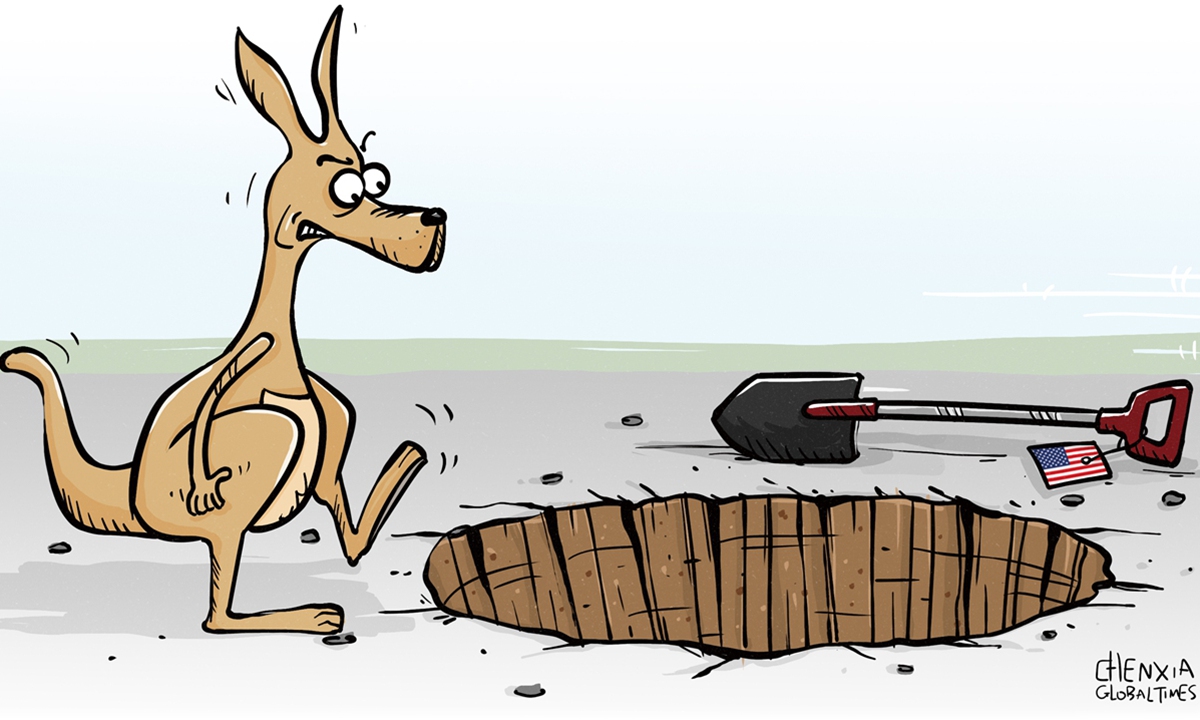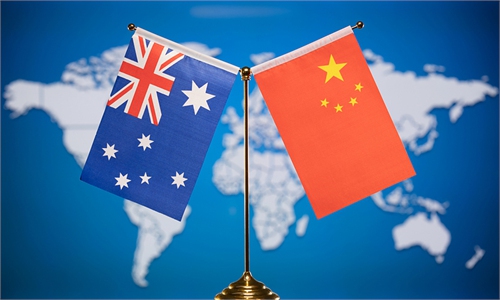
Illustration: Chen Xia/Global Times
The US requesting Australia to send a ship into the Red Sea may seem strange, but it could be an indicator of something far more sinister.To be clear, this is not an official request, and Australia is not the only country to have been asked. It was reported that seven members of the 39 nations that rotate command of the region, have apparently stepped forward to offer support, but the US has not announced who they are. At the time of writing this, Australia's decision hasn't been made, or announced, but the Opposition has said they will support the government if it decided to comply with the request.
Despite claims that Houthi Rebels are attacking commercial vessels with ballistic missiles, the available information is that they caused no significant damage and no injuries.
Reports of a Norwegian ship, and a Hong Kong-flagged ship, hit by missiles, describe that both ships steamed on. One was scheduled to stop in the port of Ashdod in Israel on January 4, the other, according to a Houthi spokesperson, was headed to Israel, although the carrier's website does not list this. However, this does indicate that the Houthis are targeting what they believe to be vessels heading to Israel.
It may be that the US, in an effort to manufacture consent for a wider escalation of this war, is overplaying this threat and some Australian media outlets seem to be slipping this request into an incubator for a consent to go to war with Iran. No evidence has been offered to support this, but many media articles describe the attackers as "Iranian-backed Houthis."
So far, no photos of damage have been offered as evidence, not one ship has been disabled and not one crew-member lost. What really is of great concern is the request of the US to involve non-local players in this conflict. In October, it was reported that the US had sent a second Carrier Strike Group (CSG) into the region. The conflict in Gaza is limited to a few square miles on land, yet the US has two aircraft carriers stationed there. If the goal is to prevent an escalation, calling on Australia and other "international allies" to get involved seems contradictory to what the US claims it is trying to achieve.
Before the request, Australia took the very unusual step of voting (in a non-binding resolution) against the interests of the US. This is something not seen in a long time. This may have been done to placate a growing domestic opposition to Israel's actions but it makes little difference since the US had already vetoed a ceasefire through the UN Security Council.
Having used its veto, the US effectively allowed Israel to continue hammering Gaza, resulting in the deaths of many more civilians. This action has caused the US to lose a significant amount of its usual support, as demonstrated by the UN General Assembly (UNGA) where 153 countries, including Australia, voted in favor of an immediate ceasefire.
Australia finds itself in a dilemma as it has voted against the continuation of hostilities, which pleases many in the Australian public, but sending a ship in support of further hostilities would not.
Pressure to the Albanese government comes from the fact that it knows much of the population would like Australia to stay out of the conflict but Australia joined Britain and/or the US in every conflict from the Boer War in 1899, up to now. To decline would set a new precedent, albeit a welcomed one.
According to a poll, 53 percent of all Australians want an immediate ceasefire. Another poll, reported in the Australian Guardian, suggests that 61 percent want Australia out of the conflict altogether. Australia's lack of involvement in the conflict supports this sentiment. The Guardian also points out that 66 percent are concerned about escalation outside of the region. This concern is justified, considering the potential for domestic escalation. There are approximately 100,000 Jewish Australians and there are more than 800,000 Muslims although less than 3,000 are Palestinians. These communities are watching developments and international media reports indicate an increase in both anti-Jewish and anti-Muslim crimes in Australia.
The Independent and Peaceful Australia Network (IPAN), a formidable and growing lobby group in a Media release on Monday stated that Australia must refuse US request to send a war ship to the Red Sea. However, politicians, particularly in Australia, don't have a good record of adhering to requests from people seeking peace.
Australia is located on the other side of the world. It has citizens from both sides of the conflict and is witnessing growing extremist movements within its own borders. It has finally stepped out of the US' shadow to call for a ceasefire and could potentially act as a mediator in the conflict if needed. That opportunity will be lost if it has a military presence in the region. It is sensible for Australia to continue distancing itself from the US.
The author is a British Australian freelance writer who has studied cross cultural change management in China and has lived in the country, traveling extensively for 17 years. opinion@globaltimes.com.cn



